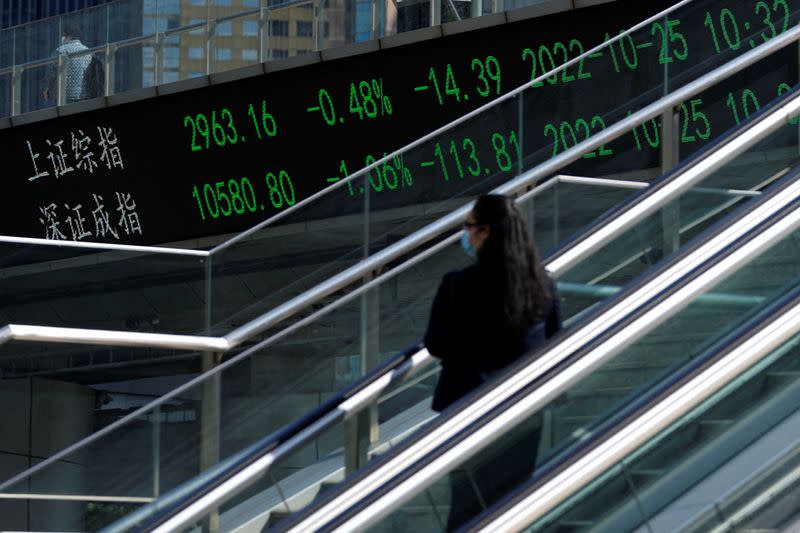Small investors in China are turning their backs on local share markets, opting for safer assets as the country’s post-Covid recovery struggles to gain momentum.
With the real estate sector stuck in a long-term crisis, households have been putting money into bonds and deposits.
Equity markets have seen slow inflows in recent weeks, having slumped about 20% this year, amid a global downturn that has created weak demand for manufacturing exports – aside from the boom in solar panels – and heightened geopolitical tensions.
Brokers and money managers had expected billions of yuan in excess savings would find their way to the stockmarket this year as the economy gathered pace and uncertainty over real estate left stocks as the only game in town.
Yet just as foreign cash has failed to materialise in China’s stockmarket, nervous households have also left equity markets adrift.
ALSO SEE:
US Funds Pull $6 Billion From China ADRs as Tensions Rise
Spooked by tech layoffs, record youth unemployment
After rallying 20% from October to January, Chinese blue chips are handing back gains and are down 1% year-to-date.
The Hang Seng is at 2023 lows, and sovereign bond yields are falling. The easiest trade of the year is fizzling, and the lost momentum is keeping investors’ money out.
“I am quite disappointed,” said Eric Yu, a programmer in his 30s in Shanghai who’s been investing for around three years.
“I will not put any more money into stocks until all my losses are recovered,” he said. Rather, spooked by the spectre of tech layoffs and youth unemployment, he has been putting some half of his monthly income into wealth and deposit products.
“Safety is more important at this time … I don’t want to lose my principal.”
Interviews with a dozen more small investors showed the sentiment to be reasonably widespread.
China’s small investors are also such a large force – accounting for some 60% of turnover, according to China Securities Regulatory Commission chairman Yi Huiman, compared with a JPMorgan estimate of less than 25% in the United States – that their lack of interest shows up in market data.
Trading dropped off in April
China’s securities margin trading balance, a measure of risk appetite, is hovering around one-month lows. Turnover in the A-share market is at the lowest level since early March.
Brokerage account creation, while volatile, likewise dropped off in April after promising momentum in February and March, China Securities Depository and Clearing data showed. Mutual fund launches, a proxy for investor interest, also fell away.
The broad Shanghai Composite trades where it did early in 2022.
“It is as if stocks are losing faith in the China recovery story,” Grow Investment Group chief economist Hong Hao said. Unusually, he noted, stocks have spilt from a years-long correlation with deposits and liquidity.
Industrial output down, loans falling
Investor enthusiasm has ebbed with softening economic indicators and a global backdrop of rising political tension and falling growth.
China’s April industrial output and retail sales growth undershot forecasts as the recovery turned wobbly. Lending has fallen sharply and unexpectedly, while Western efforts to reduce manufacturing reliance on China have gathered steam.
All of which has domestic investors saying they are too nervous to move much beyond deposits, which central bank data shows are swelling even faster than at the height of the pandemic a year ago.
“It’s quite hard to grasp investment opportunities this year as themes rotate so fast,” one such investor, Wang Zaizheng, said. “I have turned more cautious…sentiment is weak and there are also policy and geopolitical risks.”
To be sure, not every sign is negative and some see local investors’ return as a big boost that is coming eventually.
“Some market players estimate that 10% of these excessive savings could go into investment in the asset market. That would be around 800 billion yuan,” said Chi Lo, senior investment strategist at BNP Paribas Asset Management in Hong Kong.
Hayden Briscoe, Asia-Pacific head of multi-asset management at UBS Asset Management, says such investors will drive the market higher and pointed to a recent expansion in non-bank lending as a positive early sign of cash beginning to flow in the economy.
“Money’s starting to get back out,” he said.
Yet, so far the weight of it is on the sidelines. Even bright spots such as the outperforming state-owned sector, are more reflective of bond-like dividends than risk appetite and outside of the frothy AI sector, attractive returns aren’t there.
“Now my stock portfolio books a loss of about 90%,” said Meng, a Shanghai local in his 40s who gave only his surname.
He previously used to eagerly subscribe to new listings, hoping for a first-day price surge.
“I can do nothing but wait ’till it turns black.”
- Reuters with additional editing by Jim Pollard
NOTE: A minor change was made to the headline on May 30, 2023.
ALSO SEE:
China Reports Weak April Data, Record Youth Unemployment
China Bank Loans Plunge Far More Than Expected in April
Consumer and Factory Prices Drop in China as Demand Sinks
























